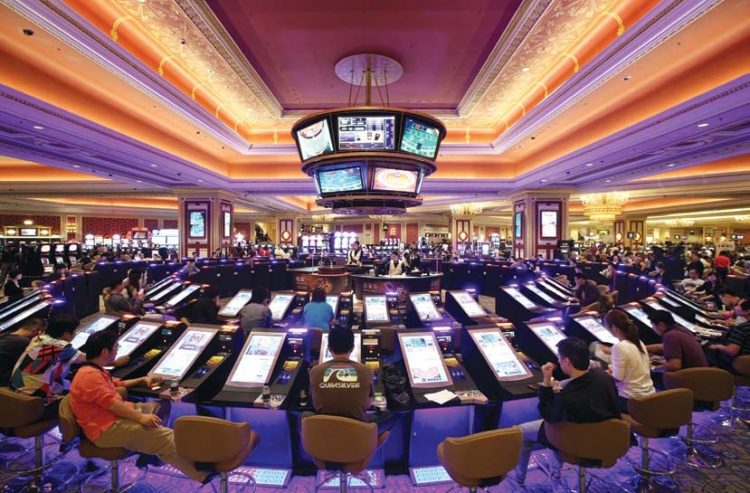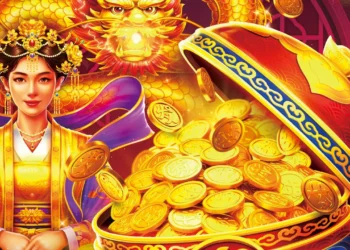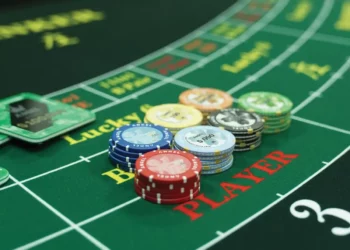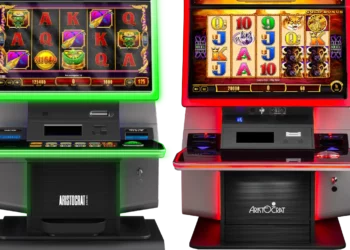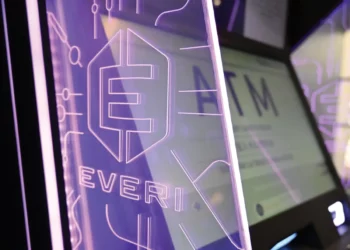A technology for all seasons, and all reasons, electronic table games are fast becoming a defining characteristic of the Macau casino experience— and their appeal doesn’t stop there
It’s interesting how Wynn Macau’s recent decision to deploy 50 electronic table game seats raised an eyebrow or two around town, with one knowledgeable observer expressing surprise that Mobil Five-Starrated Wynn was “joining the down-market, low-end mass”.
“You could infer that maybe there is some struggle going on. … Are they losing market share?”
To which three responses immediately suggest themselves:
The first has to do with capacity constraints on the Macau peninsula, the effects of which have become more pronounced as Cotai expands. This is affecting Wynn no less than its neighbors.
Commensurate with its size, Wynn Macau’s total share of the market is the lowest of the six operators anyway. Its share of VIP has been slipping (it was down an estimated 1.9 percentage points in 2012). But in part this is an expected consequence of the company’s well-known discipline on price. No doubt Cotai is costing it some mass market as well. Its share of this high margin cash play at the slots and main-floor tables was down about 2 percentage points last year and is expected to drop another percentage point or so in 2013.
The second answer has to do more with image, or illusion, as the case may be.
The company’s earnings mix is estimated to run about 47% VIP and 53% mass and nongaming, which is about the same as SJM’s, and actually it’s the second-lowest VIP ratio in the market after Sands China’s. As J.P. Morgan put it recently, “Despite always being perceived as a VIP operator, [Wynn] has gradually transformed itself into an operator with a balanced earnings profile.” For sure the company is no slouch when it comes to getting the most from its mass offering. Daily revenue at its main floor tables consistently exceeds citywide averages, while its average daily win per slot is famous for being tops in the market.
All of which speaks directly to a third point: which is that it’s simply smart management to acknowledge the tidy business that low rollers have become in Macau. Market or customer “segmentation” is a term with wide currency these days and for good reason.
“After gaining more experience, casinos now have gradually built up their customer data bases and gained a better grasp of customers’ preferences,” explains J.P. Morgan’s Kenneth Fong. “Over the past few years, casinos gradually introduced products targeting different mass segments, and these include electronic table games.” This “allows casinos to subdivide customers into distinct homogenous segments that share similar characteristics,” he says, “and helps companies prioritize marketing campaigns and tailor different service levels. This can help companies to extract maximum value from both high- and low-profit customers or increase their share of wallet.”
As MGM China Chief Executive Grant Bowie explains it, “What we’re all trying to do is get the range between the topper forming and lowest-performing tables closer together.”
With its 3% annual cap on new table supply, the government certainly has added some urgency to this quest. Part of the attractiveness of ETGs as a response is that only the live dealer version designed for theater- or “stadium”-style installations counts against the cap, depending on the number of seats (every 50 or 60, it’s not clear). So a 200-seat installation linked to three live games might count as three tables or it might count as four.
“The advantage is you have one game with 50 seats, so in effect you replicate a normal manual table game with a hell of a lot more bettors,” notes David Green of Macau based Newpage Consulting, an advisor to governments and the industry on regulatory and other issues.
It’s why e-tables are fast becoming “the preferred method of gaming directed at the lower end,” says Grant Govertsen of investment analysts Union Gaming Research Macau.
“We have noticed most operators embarking on efficiency exercises that ultimately pull live-dealt traditional table games from the lower-end mass market and reallocate them to VIP or higher-yielding mass market segments,” he says. “In turn, and in order to accommodate lower-end massmarket play, these customers are being pushed towards ETGs as the best option to play at low stakes.”
Necessity has played a similar role in establishing Singapore’s sizable business in ETGs. Like Macau the city-state is capacity restricted, each of its two IRs, Resorts World Sentosa and Marina Bay Sands, limited by law to 15,000 square meters of gaming space and 2,500 machine games. Fertile ground for what the technology has to offer, and not surprisingly, there are more than 1,200 ETG positions in the market divided about evenly between the two properties. Thus they account for about 25% of the machine market, which proportionately is much larger than Macau’s as it generates close to one-third of total gaming revenues.
There is something else that strongly recommends the technology: the speed of play.
“Hands per hour, I suspect, is much higher than a traditional game,” says Mr Green. “You can afford to drop back a little [on bet limits] if you’re getting the velocity. And my impression of ETGs is they’re velocity games.”
There being no physical cards to handle, there is no “squeezing,” where the biggest bettor at a baccarat table gets to enjoy the spot light and indulge his or her superstitions by dragging, peaking, bending, folding, dog-earing or otherwise mangling the cards in the belief that they can influence the values printed on them. It’s a time-honored ritual among Chinese gamblers in Macau, and it costs the casinos a lot of money in reduced volume. An ETG can turn over a hand in 30 seconds, theoretically 120 hands an hour, as opposed to maybe 30 an hour on a traditional table. (A VIP room hand can drag on for four or five minutes.) At HK$200 per hand at the e-table (not counting simultaneous bets on multi-games) versus $500 per hand at a conventional table it’s the difference between $24,000 in drop and $15,000. At a 1.24% house edge that’s $298 in win per ETG player per hour versus $186at a regular table. A nine-seat baccarat table fully occupied with the $500 bettors earns the casino a hypothetical $1,674 an hour. A 50-seat ETG installation filled with $200 players, which may count as only one or two tables under the government cap, garners the casino $14,900. These lower rollers also cost less in terms of comps and other perks.
“Obviously, the fact that they’re proliferating in the market says they must have significant advantages over table games,” says Mr Green.
Factor in their other virtues—the privacy and anonymity they provide, the ease of use, their modularity, the automated accounting, monitoring and data-collection functions, the ability to market to the player directly at the game—in other words, the fact that they do everything a slot machine does, including offering any number of bonus betting options—then factor in the labor savings—and suddenly it’s eminently profitable for operators to afford the smallest bettors a genuine baccarat or sic bo or roulette experience at stakes they can handle. Typically these are HK$100 at stadium installations with a live dealer. At stand-alones linked to automated games they can run as low as $10.
“Anywhere we’ve seen [ETGs] in Asia they’ve tended to do quite well,” says Mr Govertsen, “so it’s no surprise that we’re seeing more and more of them, or even that more exclusive, premium-mass, VIP-centric properties like MGM and Wynn are getting on the ETG bandwagon. It’s affirmation that ETGs are part of the Macau gaming fabric.”
This is also interesting. Because as popular as they are in places like Australia and the Philippines and in emerging markets like Singapore and Cambodia, until recently it was rare to see them in Macau outside the neighborhood slot parlors run by Mocha Clubs, which introduced them to the market about a decade ago. They didn’t come to the attention of the industry until Hong Kong listed Paradise Entertainment opened Kam Pek Paradise Casino in 2007 with a floor devoted to an innovative technology that restored the human element Chinese gamblers prefer. Developed by Paradise subsidiary LT Game, it was baccarat with outcomes determined at physical tables manned by croupiers and streamed to individual play stations in real time, the forerunner of today’s hugely popular Live Table Multi- Game System manufactured by LT.
Oddly enough, the experiment was less than successful at the time, partly due to shortcomings in the design of the terminals, partly because operators were looking to them as a cross-play for slot bettors, which they weren’t, and partly because the industry had been doubling up on live tables just when Beijing figured it was a good time to cool Macau down by restricting visas for outbound travel from the mainland, then the global financial crisis hit, and suddenly you could find HK$50 baccarat tables (and lower) anywhere in town.
Today’s boomtown is a very different place, needless to say. HK$500 minimums are the norm at the public tables. And a literal reading of the cap says the market gets only 165 new tables this year, and so on, incrementally at 3%, at least through the end of the decade—only there are eight new resorts planned for Cotai whose plans over the next five years call for something like 4,300 new tables, way more than the cap allows.
Currently, there are more than 4,000 ETGs spread across the 35 casinos either in LT Game’s stadium-style live-dealer configurations, single- and multi-game, or in banks of five to 10 seats linked to automated games. The latter the government treats as slots, each betting terminal counted as a single device. Mr Govertsen, for one, believes the market will grow to 5,500 over the next five years. “With fewer and fewer tables being released by the government,” he says, “we’ll continue to see these e-tables flourish.” This would appear to provide plenty of elbow room for competition, and so there is, but in the automated space only. Interblock, Aruze and SHFL Entertainment all participate there. In the lucrative live-dealer segment, LT Game holds a monopoly by virtue of a patent on the technology that is recognized only in Macau.
These “theater” or “stadium”-style installations are similarly popular with players in Singapore. But roulette, not baccarat, is the game of choice, accounting for 64% of seats. Multi-games (roulette and sic bo) are somewhat less popular, accounting for only about 10%, according to Union Gaming’s research.
LT has no presence in the citystate. It’s SHFL’s games that dominate, unconstrained by patent litigation with LT that has hampered their spread in Macau. SHFL’s share of Singapore’s ETGs is estimated at 48% (more than 70% at Marina Bay Sands), and the company is estimated to have about half the market in the surrounding region as well, and these markets are expected to grow by 1,500 positions or more with MGM Grand Ho Tram opening in Vietnam this quarter and Entertainment City Manila and a second NagaCorp casino in Phnom Penh coming on line over the next few years.
Slovenia’s Alfastreet runs a close second after SHFL with an estimated 40% of the market. Novomatic, Aruze and Interblock also have some share. This is worth mentioning because at a 25% premium to slot win averages, a rough benchmark believed to hold true in Macau, it’s a robust business for all concerned.
Company reports don’t break out ETG performance in either market, but they are considered slots under Singapore regulations, and it’s no coincidence that Singapore boasts some of the highest averages in daily win per slot to be found anywhere. Marina Bay Sands, whose results are published by listed parent Las Vegas Sands Corp, reported $616 in daily unit win in 2011, before deducting for discounts, on an average of 2,366 machines. That was more than twice the average at The Venetian Macao, and it was achieved in spite of strict rules in the city-state that ban advertising targeted at locals, who comprise upwards of 30% of the market. The latest figures available as of this writing show daily unit win at MBS holding at a creditable $630 through the third quarter in what has been a down year for both MBS and Sentosa. Extrapolating from this performance it’s possible that Singapore’s e-tables are booking in the neighborhood of $800 per seat per day, maybe more, which at Marina Bay Sands might have been good for about US$44.2 million in the third quarter, or more than one-third of its total slot haul in what is arguably the most lucrative machine gaming market in the world pound for pound.
In Macau, at the end of 2012 there were approximately 1,300 terminals in stadium installations in Sands China’s five properties and in Melco Crown’s City of Dreams. There were another 2,200 or so spread around town in various automated stand-alone configurations, with sic bo actually enjoying the largest single-game share, according to Union Gaming.
The live multi-games generated MOP895 million in revenue last year (US$119 million), up from MOP153 million in 2010—and it all belonged to LT Game, which is battling SHFL in the Macau courts.
The dispute flared into open war at The Venetian during last May’s Global Gaming Expo Asia. SHFL was determined to exhibit its Rapid series of live games and Rapid Fusion multi-games at the show. Macau customs officials descended on the company’s stand, summoned by LT, and a burlesque of sorts followed: white sheets were thrown over the games to hide them from view. SHFL took its case to the show’s organizers, the American Gaming Association and trade show giant Reed Exhibitions. The sheets were removed then replaced as lawyers from the two sides hashed it out. They were pulled off for good finally on the second and final day of the expo.






